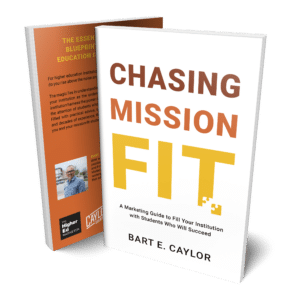Scaling AI Fluency for Marketing Teams: How ASU Leads with Innovation and Intent
See how ASU is leading AI fluency for marketing teams through leadership buy-in, innovation challenges, and custom tools that drive real, campus-wide impact.
Featured
AI in higher education is transforming the industry. From this point on, the game has irrevocably changed.
Artificial intelligence is reshaping how institutions engage with students, design curricula, and manage administrative tasks.
At this moment, we are living in the Gold Rush era of artificial intelligence.
AI is integrating more and more into the world of higher education, and everyone is hoping for their morsel of success.
It’s crucial now more than ever to begin educating yourself on the future of AI in higher education.
If you push off your studying for later, you may be left in the dust!
To talk about this, we brought on two guests, Andrew Cassel and Brian Piper, for an AI roundtable discussion to inform, inspire, and get you thinking about the potential of AI tools at your school.
In this episode of The Higher Ed Marketer podcast, we dissect all things artificial intelligence as we look towards the future of higher ed.
At the beginning of our conversation, we covered how AI’s impact on higher education is profound and multifaceted, offering both opportunities and challenges for institutions.
In many ways, this is like the Gold Rush back in the 1800’s.
It all started with somebody washing his clothes in a creek in California who noticed something shiny. They picked it up and realized, “Oh, this is gold!”
Quickly, word got out back East. Everybody realized this was an incredible opportunity because the gold was being found on public lands.
Anybody could just arrive, start panning for gold, and walk away extremely rich.
These guys didn’t know how to pan for gold. They just showed up, and people started learning it. Then, they started teaching other people.
That’s where we are today.
Right now, you can sign up for a free OpenAI account for ChatGPT, and literally just start learning how to use AI in higher education, like they learned how to pan for gold. 
You might feel as though artificial intelligence is out of your realm of expertise, but it is something you can (and I believe should) learn.
If you don’t, someone else absolutely will!
This is the next Gold Rush, and I want to encourage you to be an early adopter and get all the benefits of it you can.
AI technologies, particularly advanced data analysis capabilities like those found in ChatGPT, can be transformative.
AI tools enable marketers to amalgamate and analyze data from diverse sources efficiently, providing deep insights that were previously challenging or time-consuming to obtain.
Brian Piper discussed AI’s capability in data analysis, which allows for more nuanced and informed decision-making processes at institutional levels.
I just recently started playing around with the advanced data analysis capability within chat GPT—and it may be, hands down, the most powerful feature of this tool.
I can’t believe the way that I’ve been able to combine data from multiple different documents to get valuable insights and answers.
This capability allows you to understand complex student behaviors and preferences, tailor marketing strategies more effectively, and optimize outreach campaigns.
By harnessing the power of AI for data analysis, higher education marketers can enhance their decision-making processes, leading to more targeted and successful marketing outcomes.
AI technologies are revolutionizing student engagement and personalized learning.
Tools like chatbots can provide students with instant responses to their queries, significantly improving communication and satisfaction.
AI-driven analytics enable educators to tailor their teaching methods to individual learning styles, potentially increasing student engagement and success rates.
AI applications are streamlining administrative tasks in higher education by automating routine processes such as admissions, scheduling, and student assessments.
This shift not only reduces the administrative burden but also allows colleges and universities to reallocate resources towards more strategic initiatives.
The integration of AI in higher education is not without its ethical concerns.
Issues such as data privacy, surveillance, and the potential for bias in AI algorithms are critical considerations that institutions must address.
Both Cassel and Piper underscored the necessity for transparent and responsible AI use, ensuring that these technologies are implemented in ways that respect student privacy and promote fairness.
Cassel used the Gold Rush analogy to help us understand this side of things.
That brings us right back to the Gold Rush because these were public lands. You could walk up to any stream, stick your [pan] in there, and get the gold out.
Now, what if there was a landowner right across the street? The stream is [on his] land.
[Many prospectors would say] “But I don’t think that [it is] your land! I’m taking the gold. You can’t stop me!”
[In time,] the rules will come. These tools will develop ways for concerned artists or creators to say, “I don’t want your machine learning models trained on my work. I don’t want it.”
Also, Cassel reminds us of the economic incentives at play.
While [AI tech companies] recognize that this is an important part in the development of how humans interact with technology and collaborate with these tools, they also need to make money.
They realize that if they are not finding ways to [handle] these moral and ethical considerations, nobody’s going to use [their technology], and they will go by the wayside.
The pace of people using [AI technology] is outstripping the regulations that are going on in there. But [the regulations] will get caught up at some point.
In other words, where money is involved, regulations will also begin to be implemented to protect the rights of creators and consumers.
As AI continues to evolve, higher education institutions must stay ahead of the curve by continuously updating their policies and practices related to AI use.
Andrew gave us a helpful example of using AI in higher education.
In our colleges, we have events calendars. There are events happening across our campuses all the time.
Some of these events are just little mentions of a super cool thing. They don’t have a poster. They don’t have a flyer. They don’t have a photo of anything in there.
So, what you can do today is to get a free account on the generative AI image tool of your choice. Then take the description of the event, put that into the prompt, and you’ll get something that’s evocative and eye catching.
That’s all you need for social media content to arrest the scroll for a moment, and your generative AI image can do that!
Implementing AI like this involves training faculty and staff to effectively utilize AI tools, as well as incorporating AI literacy into curricula to prepare students for a technology-driven world.
To get us started, Brian gave some great tips, beginning with a helpful learning resource.
I highly recommend for anyone in marketing the Marketing AI Institute. They do a weekly podcast where they talk about everything that happened that week.
Every week there is so much information. It’s a great way to start understanding how some of these different tools and techniques can be used and leveraged in marketing.
Ethan Molik is also another great person to follow on X and LinkedIn. He has great posts about different ways to use different tools.
But as you continue to learn from these resources, Brian stresses the importance of “playing around” with the technology.
At first, you may not know what you’re doing, but you will get there if you just start playing around with the technology.
The integration of AI in higher education offers a promising avenue for enhancing educational experiences and operational efficiency.
However, it requires careful consideration of ethical issues and a proactive approach to technology adoption.
By embracing AI, institutions can not only improve their administrative functions and student interactions but also equip learners with the skills necessary for the future.
For more insights on how AI is transforming higher education, listen to the full episode of the Higher Ed Marketer podcast featuring experts Andrew Cassel and Brian Piper.
Discover how your institution can navigate the challenges and seize the opportunities presented by AI in today’s educational landscape!
The essential marketing book every higher education institution needs! If you are a higher education marketing professional seeking a fail-safe plan to make your institution stand out, “Chasing Mission Fit” is your guide.

So you can empower your institution with audience-focused marketing strategies, and attract mission-fit students who will flourish in your unique academic environment.
Ready to transform your institution’s marketing approach?
Order now!
Featured image by peopleimages.com via Adobe Stock
Subscribe to The Higher Ed Marketer podcast today!